Navigating shared custody and communication after a relationship has run its course can be tough. Luckily, technology offers many co-parenting apps for divorced parents to help you manage schedules, messaging, expenses and more. These co parenting websites and tools let you track parenting calendars, chat with your ex without conflict, and even document everything for court if needed. However, with multiple features and platforms available, choosing the right app can feel overwhelming.
In this guide, we cover the 14 best apps for co-parenting to use when you’re no longer together, with a detailed overview of features, real-user feedback, pricing details, supported devices and ratings, to help you make an informed choice. Whether you need a free co-parenting app to share schedules or a robust tool for high-conflict situations, you’ll find options here to suit your family’s needs.
Why Co-Parenting Apps Can Help Estranged Couples
Table of Contents
When you’re estranged from your co-parent, the simplest things like who’s picking up the child from school can turn into a battle. Calls get ignored, texts are taken the wrong way, and before you know it, the focus shifts from the child’s needs to yet another argument. Communication problems are the first to pop up, and that’s exactly where co-parenting apps for divorced parents step in.
1. Communication
Firstly, these co-parenting tools give you one clear channel to talk without the back-and-forth of phone calls or endless messaging. Every conversation stays in one place, so you don’t have to dig through old texts or emails. And because many custody apps for estranged couples don’t allow messages to be deleted or edited, they create a record that both parents can rely on, which is something that matters a lot when trust has worn thin or legal matters are involved.
2. Scheduling
Then there’s scheduling. A shared calendar sounds simple, but it can ease a lot of tension. You both know when your child has sports practice, doctor’s visits, or school events. No one can claim they weren’t told, and the child doesn’t get caught in the middle of forgotten handovers.
3. Finances
Even money, which is often a sore spot, becomes less of a flashpoint. Some apps let you log expenses, upload receipts, and track reimbursements. It’s not about keeping score; it’s about making sure the child’s needs are met without constant arguing over who paid what.
In short, these apps don’t magically fix the relationship, but they take the daily friction out of parenting apart. They create structure where chaos easily creeps in and give both of you space to focus on your child, which is really the point of all this in the first place.
What To Look For In A Co-Parenting App for Estranged Relationships
When you’re parenting with someone you no longer get along with, the details matter. An app can’t fix the history between you, but the right features can keep day-to-day life smoother and stop small issues from turning into another argument. Here’s what you should keep an eye out for:
- Open communication: You don’t want to go back and forth over who said what. Look for an app where messages are time-stamped and can’t be changed or deleted. That way, you both have a record that keeps things transparent.
- Shared calendar: School events, medical appointments, pick-ups, holidays; having them in one place reduces missed dates and last-minute confusion. It also takes the burden off your child to be the go-between.
- Expense tracking: Money is one of the biggest flashpoints. An app that lets you log expenses, upload receipts, and request reimbursements cuts down on fights about who paid for what.
- Court-friendly documentation: If your situation involves legal proceedings, it helps to have records that are admissible in court. Some apps specialize in creating these kinds of reports.
- User-friendly design: Fancy features won’t matter if the app feels clunky. You need something you can check quickly between work and home without fumbling around.
- Options for professionals to join: In high-conflict cases, lawyers, mediators, or therapists may need access. Having that built into the app can save you from passing around screenshots later.
- Security and privacy: Sensitive conversations and financial records shouldn’t feel exposed. Choose an app that takes privacy seriously and makes it clear how your data is stored.
Legal, Safety & Privacy Considerations
When you’re co-parenting as estranged partners, the app you choose can also be evidence. Many apps create uneditable records that courts may accept if disputes arise, so it’s worth checking whether your region recognizes them. Safety is another concern: keep your personal number and email private by using in-app messaging instead of direct contact. And don’t overlook privacy. These apps hold sensitive details about your child, finances, and schedules, so make sure the one you pick uses secure data storage and clear policies on who can access your information.
14 Best Apps For Co-Parenting When You’re No Longer Together
When couples part ways, finding peaceful ways to communicate effectively is crucial. The apps below help maintain open lines between parents, keep everyone on the same schedule, and reduce misunderstandings. You’ll find dedicated co-parenting calendars, messaging platforms that create court-friendly records, and tools for tracking expenses and custody schedules. Ready to explore the best co-parenting app options for your needs? Read on:
1. OurFamilyWizard
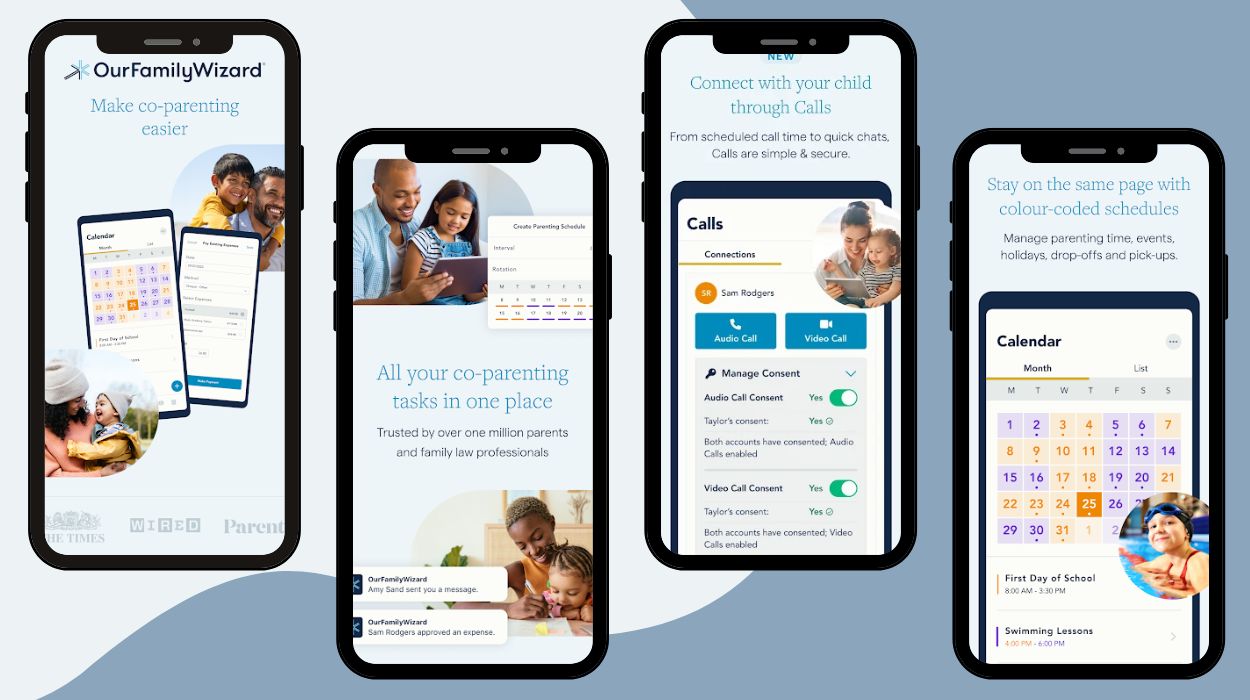
OurFamilyWizard is often called the “gold standard” of co-parenting apps for divorced couples, and with good reason. It bundles a shared custody calendar, expense log, messaging, and more in one secure platform. The app aims to reduce arguments by timestamping every message, nothing can be deleted, and even has a “ToneMeter” to flag heated language, making it the best co-parenting app for high conflict situations. The OurFamilyWizard co-parenting app also lets parents do virtual visits via audio/video calls, with automatic documentation of time and activity, and keeps critical kid info in an “Info Bank.” Courts and lawyers often recommend it.
Related Reading: 11 Ways To Remain Sane During a Divorce
Features
- Secure messaging: Chat in a single app instead of texts or emails. Records are permanent
- Shared custody calendar: Color-coded schedule for visits, pick-ups and holidays
- Expense tracking: Log shared child-related bills and receipts in-app
- Kids’ info bank: Store school contacts, medical info, clothing sizes, etc
- Recorded calls: Record custody calls or video visits, with all details saved to your record
One user, named ArtemisSolas, praises OFW as “a great shared calendar and parenting app period,” noting that it keeps the family on the same page. Another calls it “worth getting”, despite minor bugs.
Pricing
| Plan | Cost | Features |
| Essentials | $149.99 (one-time) | Unlocks core features like messages, calendar, etc |
| Premium | $219.00 (one-time) | Full feature set, includes extras like call history, reports |
Available on: iOS, Android and Web
Rating: 4.5★ on App Store and 4.0★ on Google Play
2. TalkingParents
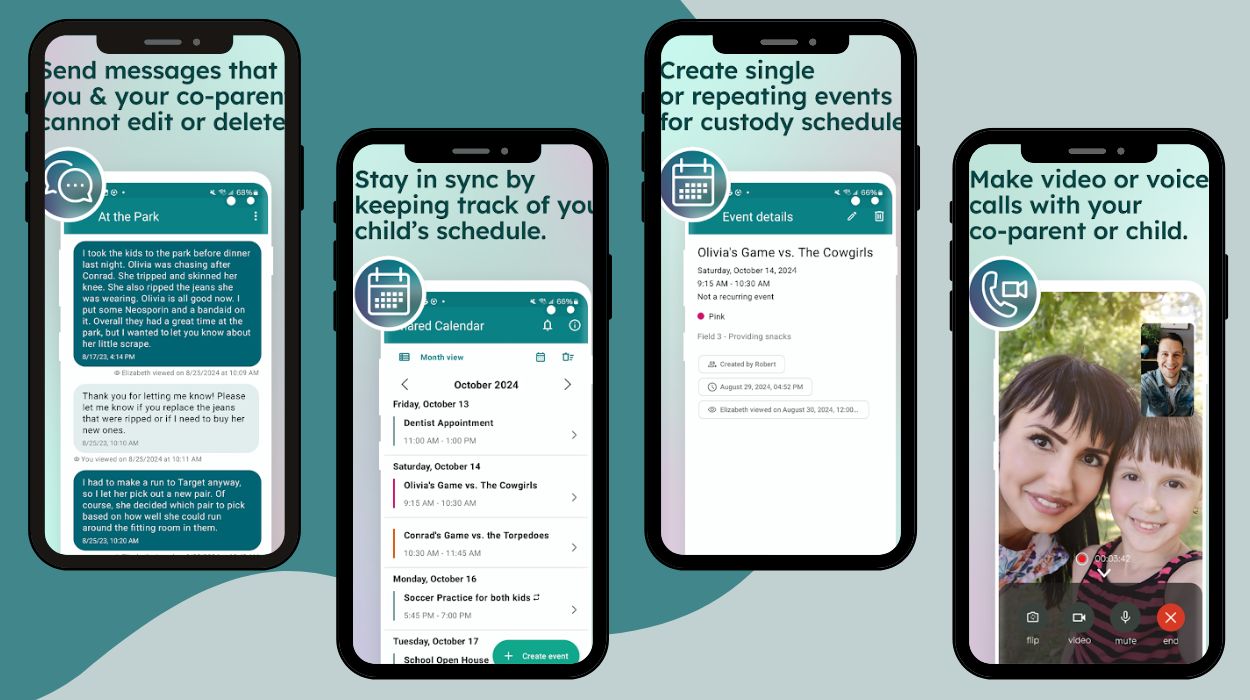
The TalkingParents app is a transparent app for divorced parents to communicate. All conversations, be it on texts or calls, are permanently recorded on both sides and cannot be edited or deleted. This feature not only makes it one of the court-admissible family communication apps but also gets it picked as the best co-parenting app for high conflict situations by estranged couples. It also includes a shared calendar and an integrated calling feature, both audio and video, that logs the conversation details. Many co-parents use it exactly so “there’s a permanent record” of what was said. Thanks to these comprehensive features, the TalkingParents app is commonly recommended for contentious custody cases.
Features
- Immutable messaging: Secure text and message board. Neither parent can alter history
- Recorded calls: Make voice/video calls through the app that are automatically recorded and dated
- Shared calendar: Co-parenting calendar for scheduling pick-ups, drop-offs and events
- Payments: Track support or expense payments between parents
- Standards & Privacy: Notifications when messages are read and secure access
According to one iPhone user, TalkingParents is “Amazing!!!” because it gives proof of communications and has an “amazing” calendar. The reviewer, JNFrost, notes that the time-stamped messages and schedule help protect you in custody issues.
Pricing
| Plan | Monthly Cost | Features |
| Free | $0 | Basic messaging via website, no app access |
| Standard | $12/month ($120/yr) | Full mobile app with messaging, calendar, calls |
| Premium | $27/month ($270/yr) | All Standard features, plus advanced support |
Available on: iOS, Android and Web
Rating: 4.4★ on App Store; 2.9★ on Google Play
3. AppClose—Free co-parenting app
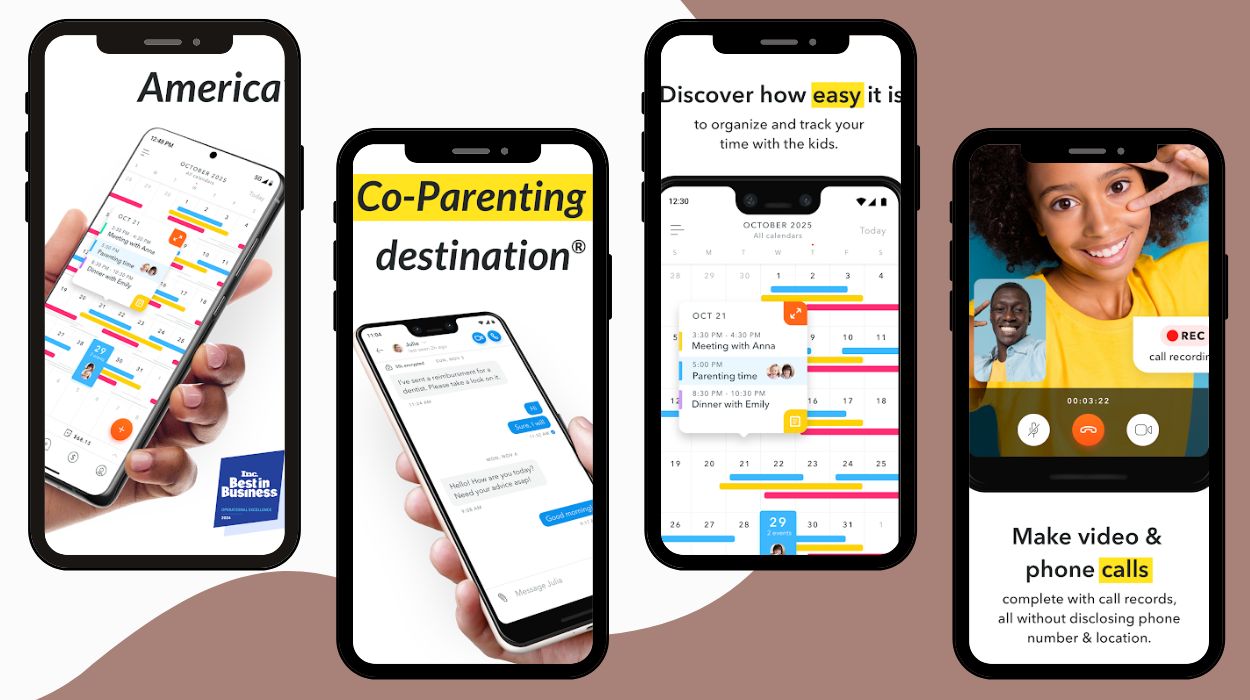
AppClose is a free co-parenting app built around messaging and scheduling. It offers unlimited secure texts, a shared calendar and even bill-splitting tools, all at no charge. You can also make voice/video calls, with parental override, request custody changes, and keep detailed records. Because it’s free, many families use AppClose as a starting point. Its calendar and messaging make it easier to coordinate drop-offs, and you can log and split expenses in the app, thus streamlining co-parenting after divorce.
Features
- Free messaging & calendar: Unlimited secure chat and a shared custody calendar. No subscription needed
- Calls & video: One-touch audio/video calls. You can also use it like FaceTime for kids, with logs of time
- Expense tracker: Log and request payment for shared costs. It auto-tracks receipt photos, splits costs
- Medication & insurance logs: Helpful for tracking medical appointments or meds
- Request features: Send and approve scheduling requests for make-up days or changes
One Reddit user with a difficult ex raves, “It’s free. Calendar, messages, receipts and [payment] section. My attorney can monitor the chats. It also allows for calls… I blocked [him] from my phone and only communicate through the app.”
Pricing
| Plan | Price | Features |
| Free | $0 | Unlimited use for all tool, no ads |
Available on: iOS, Android and Web
Rating: 4.6★ on Google Play and 4.7★ on AppClose site
4. Cozi Family Organizer
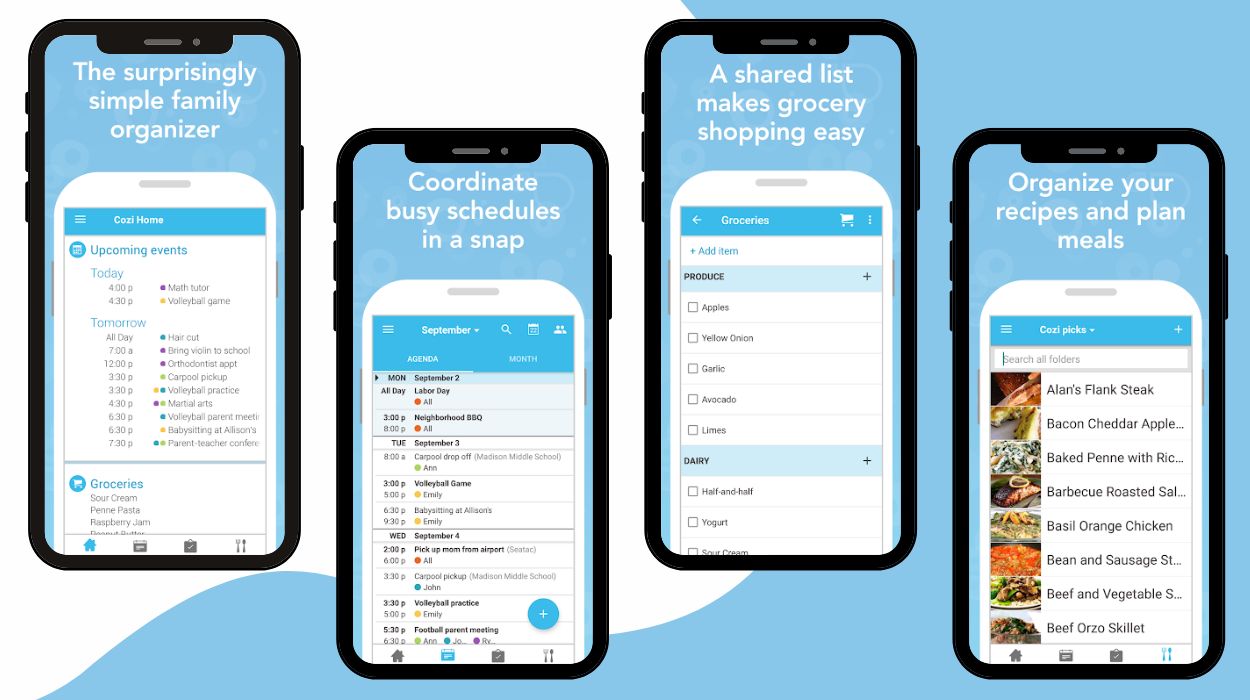
Cozi is a general family organizer that works well for co-parents who share all family duties amicably. It’s essentially a co-parenting calendar app with a few extras. Cozi includes a shared, color-coded calendar, to-do lists and chore lists, grocery/shopping lists, and even a meal planner with recipes. It doesn’t have court-focused record-keeping, but it does sync easily between devices and helps “keep everyone in the know.” Many separated families use Cozi as a free co-parenting app. The basic version is free but ad-supported.
Related Reading: How to Prepare Yourself and Your Children for Divorce
Features
- Shared family calendar: Color-coded schedules where both parents add events
- Lists and tasks: Unlimited shared to-do lists, chore lists and shopping lists
- Meal planner: Store recipes and plan meals; auto-add ingredients to shopping lists
- Agenda emails: Cozi can email you a daily agenda of that day’s events so nothing is missed
- Cross-platform: Accessible on iOS, Android and web, and integrates with Google/Microsoft calendars.
One user calls Cozi “the must-have organizer for families,” saying it helps “coordinate and communicate everyone’s schedules and activities.” Many parents report that Cozi’s free version solves their scheduling headaches without any conflict.
Pricing
| Plan | Cost | Features |
| Free (Basic) | $0 | Shared calendar, lists, recipes |
| Cozi Gold | $39/year | Ad-free, extra reminders, full month view |
Available on: iOS, Android and Web
Rating: 4.6★ on Google Play and 4.7★ on App Store
5. CoParently
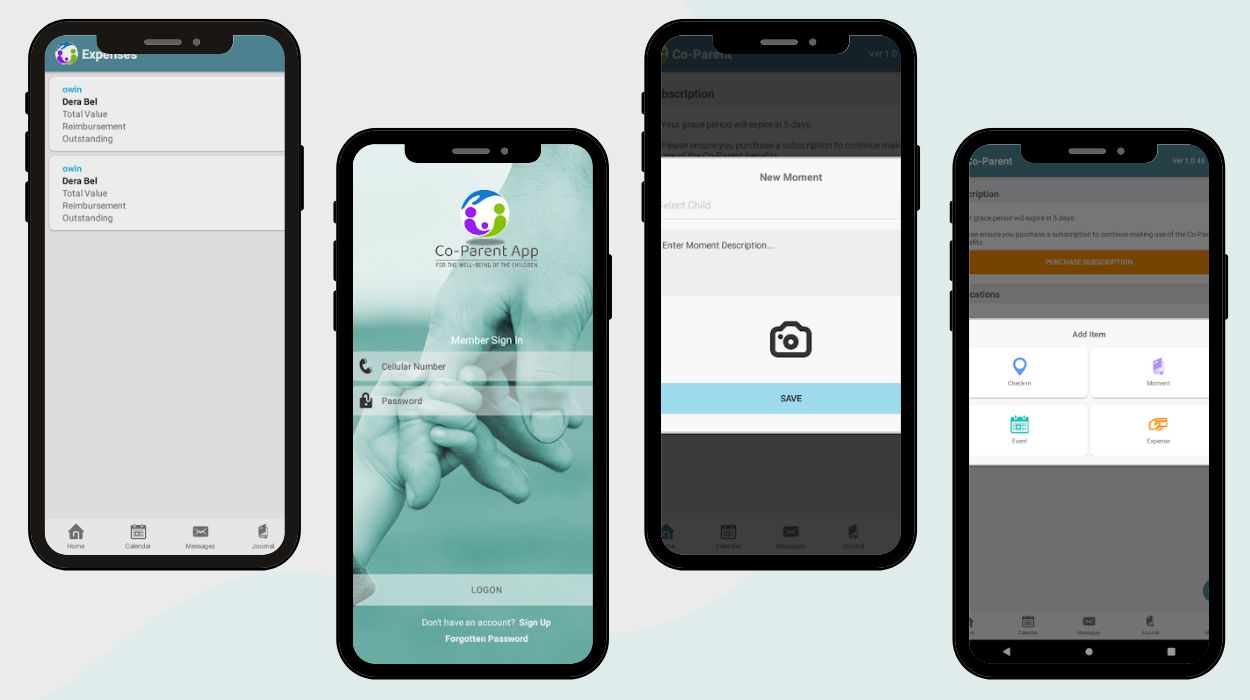
The CoParently app combines key co-parent tools for divorced parents to handle joint custody effectively. It offers a shared, color-coded custody calendar, expense tracking, secure messaging, and a central contact directory. Every conversation and transaction is saved so you have print-ready records if needed. It doesn’t have video calls, but it shines at keeping schedules and money straight between homes, making it one of the most effective co-parenting apps for making sure everyone involved is on the same page.
Features
- Custody calendar: Visual, color-coded schedule showing which parent has the kids each day
- Secure messaging: Internal chat and email-style messaging that’s saved permanently
- Expense/receipts: Track shared expenses, upload receipts, and request reimbursements
- Shared directory: Store important info like doctor names, school contacts, social media, etc
- Reports and prints: Generate printable reports (calendar logs, messages, expenses) for court
Coparently’s website touts it as a “one-stop-shop” that uses plain language tools for parents, no legalese. It is widely used as a communication app for divorced parents to share schedules and bills without chaos.
Pricing
| Plan | Price (per month) | Features |
| Free | $0 | Limited use, basic messaging |
| Premium | ~$20/mo (family) | Full access to all features, can be used for multiple kids |
Available on: iOS, Android and Web
Rating: 4.4★ on App Store and 4.2★ on Google Play
6. WeParent by SupportPay
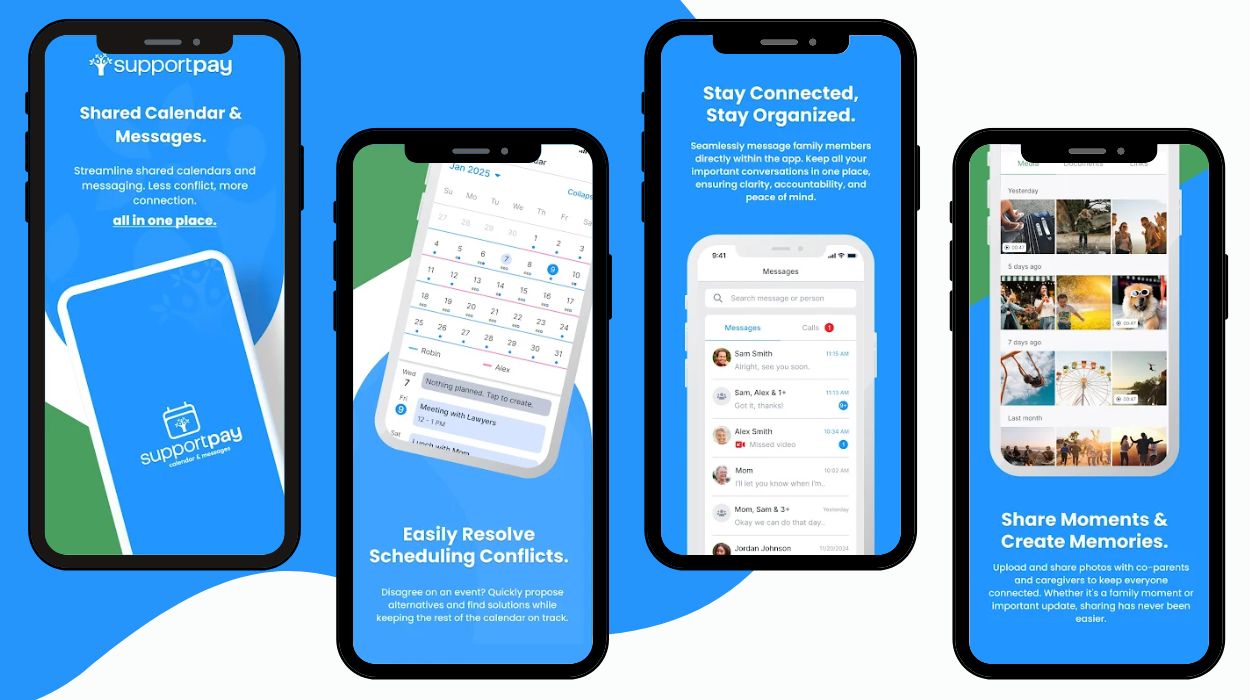
WeParent, now SupportPay: Calendar & Messages, is a newer app aimed at co-parent scheduling and chat. It includes a shared family calendar, message threads, task lists, and data vaults for medical or insurance info, all in a “one stop” family organizer. The startup model ties it to the SupportPay expense app and premium SupportPay access unlocks the calendar/messaging for free. It was actually built by SupportPay, a child-support app, to complement expense tracking.
Features
- Family calendar: Schedule doctor visits, routines, and events with templates
- To-do & shopping lists: Create shared lists and tick off tasks together
- Real-time chat: Private or group messaging for family members. Message history is archived
- Info vault: Store important contacts and details in a searchable archive
- Certified archiving: Messages are saved permanently, making it great for compiling information for court records if needed
Users appreciate that WeParent is “an app designed by parents for parents.” It emphasizes easy coordination and even location-sharing.
Pricing
| Plan | Cost | Features |
| Free Trial | 14 days free | Full access during trial |
| Family Plan | ~$15–20/month (estimated) | Covers all family members via SupportPay |
Available on: iOS and Android
Rating: Still too new to have substantial ratings
7. 2houses
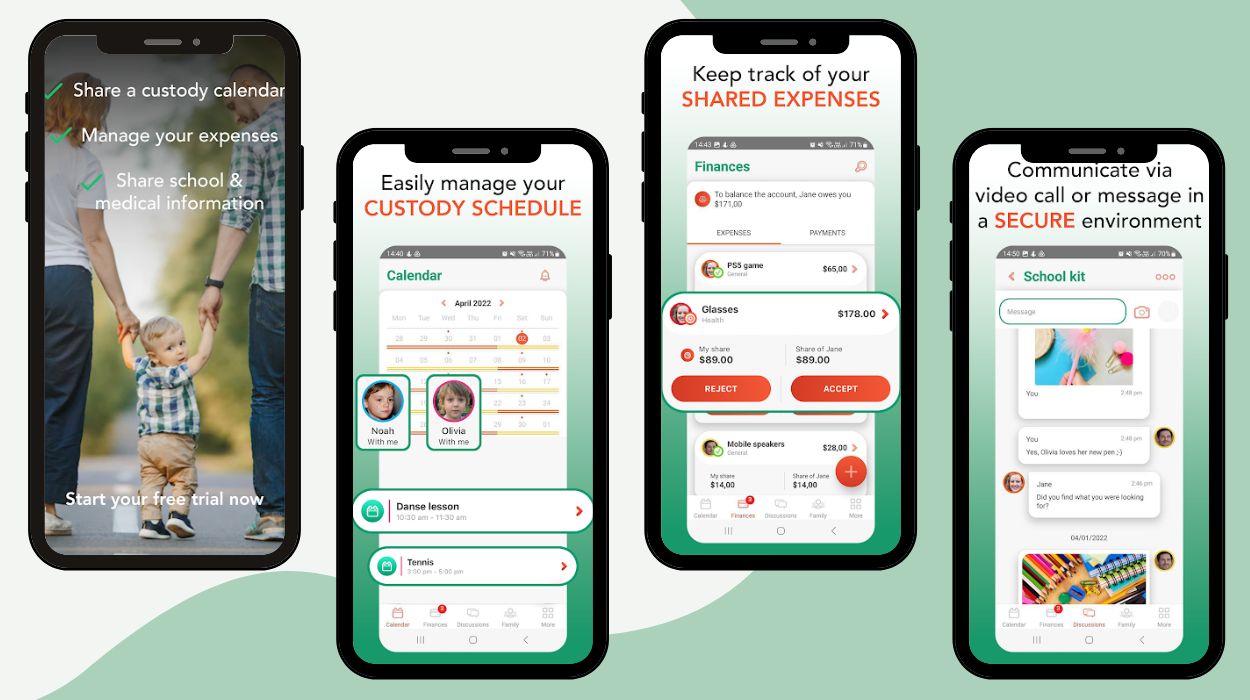
The 2houses app is another comprehensive co-parenting platform with both web and mobile apps. It offers everything from a shared calendar to messaging, plus excellent features for tracking and managing finances. You get a joint calendar, expense management, with balances and reports, secure chat, plus a “journal” and photo albums for sharing moments. 2houses is one of the few co-parenting apps with such a sharp focus on expense-tracking. You log what each parent pays and see running balances, bringing great transparency to money matters and preventing further strain on the relationship due to money issues.
Features
- Interactive calendar: Shared custody schedule with edit rights for each parent
- Expense manager: Track bills and reimbursements. See who owes what in real time
- Messaging: In-app secure chat. Threads with the other parent, children, mediator
- Info bank: Store important contacts like schools, doctors, or sports coaches in one place
- Journal & albums: Private “journal” for notes/photos about the kids; share memories with each other
Users often praise how 2houses “keeps everything in one place.” One parent wrote on the App Store that after juggling calendars and spreadsheets, 2houses was a “godsend” that makes tracking schedules, expenses, docs, etc. painless.
Pricing
| Plan | Price | Features |
| Family Plan | $169.99/year | All features, covers both parents and kids |
Available on: iOS, Android and Web
Rating: 3.9★ on App Store and 4.2★ on Google Play
8. Custody X Change
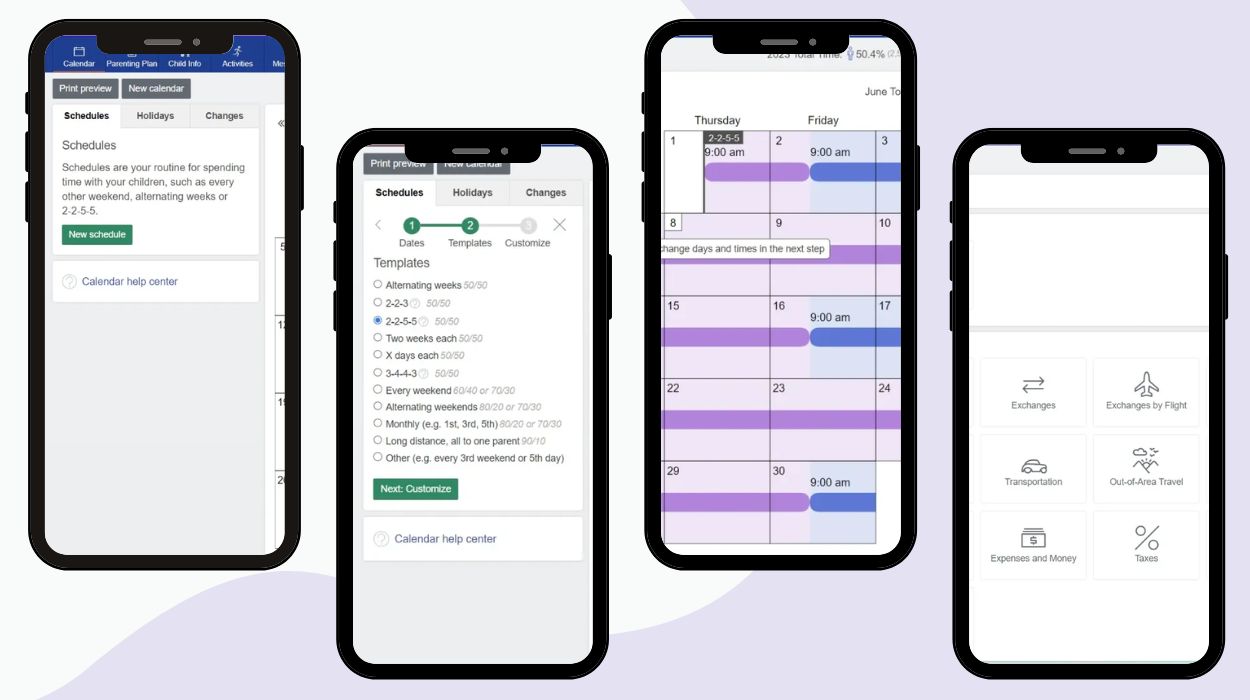
Custody X Change is primarily for custody scheduling and documentation. It’s undoubtedly among the best apps for co-parenting but one that works a bit differently: this app and web service helps you draw up parenting schedules and keep detailed logs of exchanges, child’s activities, and expenses. Think of it as a digital custody calendar/planner that can produce court-ready reports. If one parent isn’t sticking to the plan, you can show an attorney the records easily.
Related Reading: Lonely After Divorce: Why Men Find It so Hard to Cope
Features
- Custom custody schedules: Build day/night or hourly parenting time tables and share them with co-parent
- Log keeping: Record pickups, drop-offs, delays, missed exchanges and any incidents
- Expense tracking: Log child-related expenses to demonstrate who paid what
- Report generation: Print out polished spreadsheets/diaries of any tracked data for court or mediation
- Courts-approved: Many attorneys use it for trial exhibits; data is timestamped
An attorney notes that Custody X Change is great for legal evidence: when one parent disputed the schedule, “Every time [the other] brought it up, she dismissed his concerns. Using Custody X Change, [he] tracked every deviation, providing clear documentation.”
Pricing
| Plan | Price | Features |
| Single License (Desktop) | $29.95 one-time | Standalone basic plan |
| Co-Parent License | $5.99/month or $64/yr | Shared access for both parents |
Available on: Windows; no mobile app
Rating: 4.7★ on Google Play and 4.8★ on App Store
9. FamCal
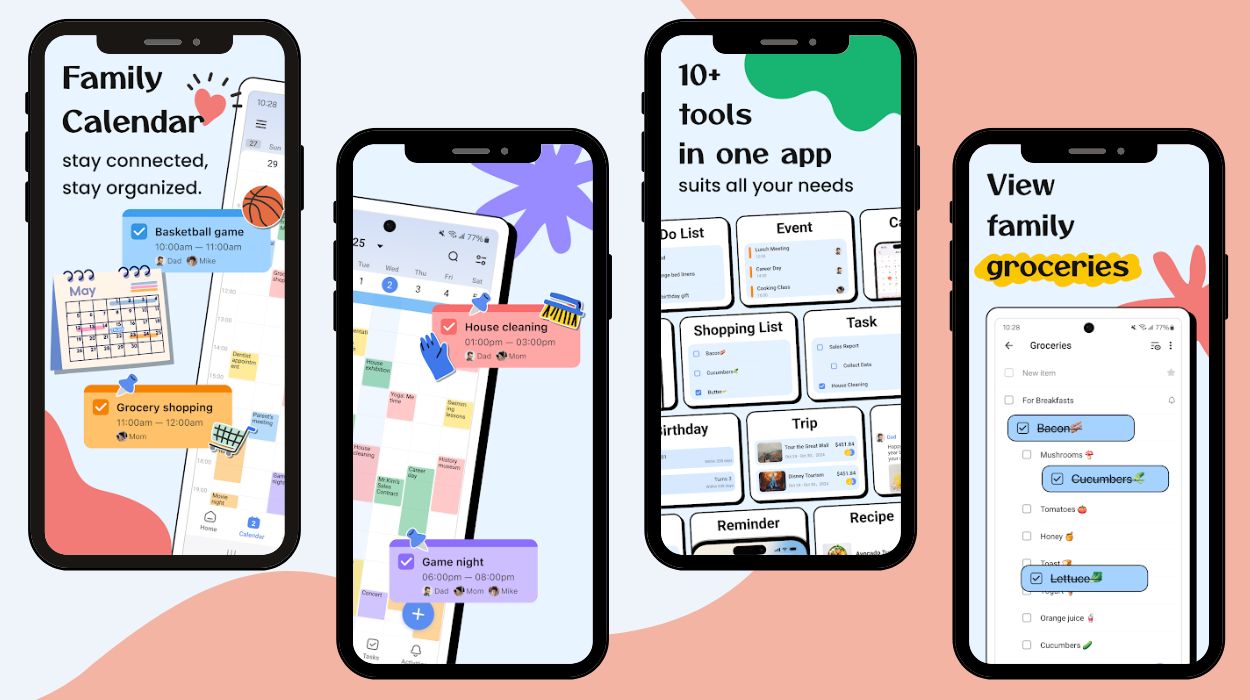
FamCal is a popular co-parenting calendar app focused on sharing schedules, tasks and lists among family members. It’s very family-friendly: one shared login and password, where parents and kids can add events, notes, to-dos and grocery lists. The free version is ad-supported, and you can upgrade to FamCal Gold for ad-free use and extra features. It’s not legal documentation software, but it’s lightweight and works offline.
Features
- Family accounts: Multiple adult members plus child profiles, which can be created without email
- Shared calendar: All family events appear in one unified schedule
- Lists and tasks: Share grocery lists and unlimited to-do lists that anyone can update
- Notes: Jot down family memos and leave comments for each other
An App Store reviewer, Whzr, calls FamCal a “great way to keep family organized,” praising its free features that made her life “so much easier” with to-do lists and grocery lists. It’s essentially a free co-parenting app for schedule coordination.
Pricing
| Plan | Cost | Features |
| Basic (Free) | $0 | All core features with ads |
| FamCal Gold | $3.99 (weekly) | Remove ads and advanced features |
| ~$39.99/year (est.) | Annual Gold plan |
Available on: iOS, Android and Web
Rating: 4.9★ on App Store and 4.7★ on Google Play
10. SupportPay
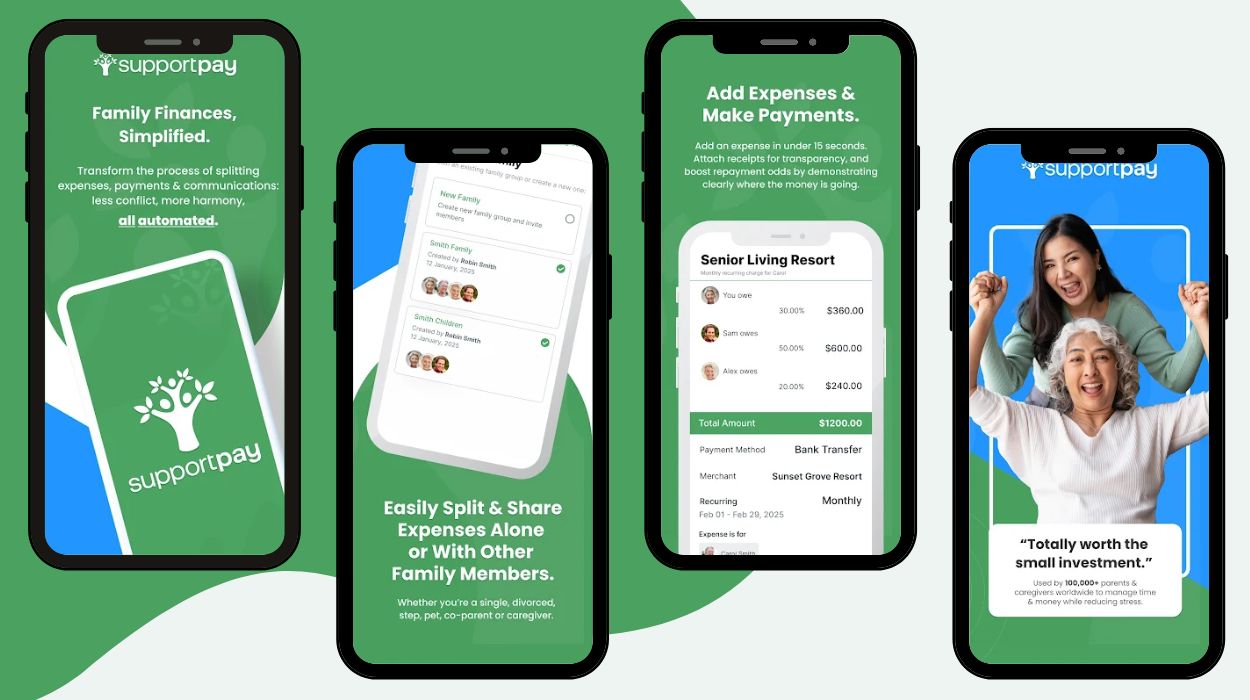
SupportPay is among the specialized apps for shared custody that focuses on managing child support and shared expenses. You can link your bank or card, log every payment or expense, and the other parent sees when it’s paid. It also has a basic co-parent messaging feature and family calendar, since it’s tied to the WeParent app. SupportPay’s main advantage is automating expense tracking. You can scan receipts, split bills, and schedule recurring payments so that you always have a clear payment history. This can reduce disputes over support or reimbursements.
Features
- Expense sharing: Upload child-related receipts and request reimbursements through the app
- Child support tracking: Log official support payments and generate a running ledger
- Integrated chat and calendar: Communicate with co-parent and keep a family calendar via the included WeParent tools
- Notifications: Receive alerts when the other parent marks a payment or adds an expense
- Reports: Export summaries of payments and expenses for taxes or court
SupportPay’s blog notes it’s “the only solution for modern family finances,” emphasizing its secure, real-time expense management.
Pricing
| Plan | Cost (if any) | Features |
| Free | $0 | Unlimited expense tracking, no fees |
Available on: iOS, Android and Web
Rating: 4.0★ on App Store) and 3.7★ on Google Play
11. TimeTree

TimeTree is a versatile shared calendar app used by many co-parents for free scheduling. You and your ex can subscribe to the same calendar, add events, and comment on them. TimeTree also has a chat feature for each event, which can double as communication. It’s less formal than some other apps and there are no permanent records of conversations, but families love how easy it is to coordinate things through this platform.
Related Reading: Divorce By Mutual Consent – Bridges Vs Battlegrounds
Features
- Multi-user calendar: Create one or more calendars that both parents can edit
- Event chat: Each calendar event can have its own comment thread for details and confirmations
- Notifications: Get alerts when the other parent adds or changes events, so nothing is missed
- Integrations: Sync with Google Calendar, and import/export events
One Reddit user reports: “We use TimeTree, works well for us.”
Pricing
| Plan | Price | Features |
| Basic | $0 | Unlimited calendars and users |
| Premium | $4.49/month | Remove ads, more calendar features |
Available on: iOS, Android and Web
Rating: 4.7★ on Google Play and 4.8★ on App Store
12. Google Calendar
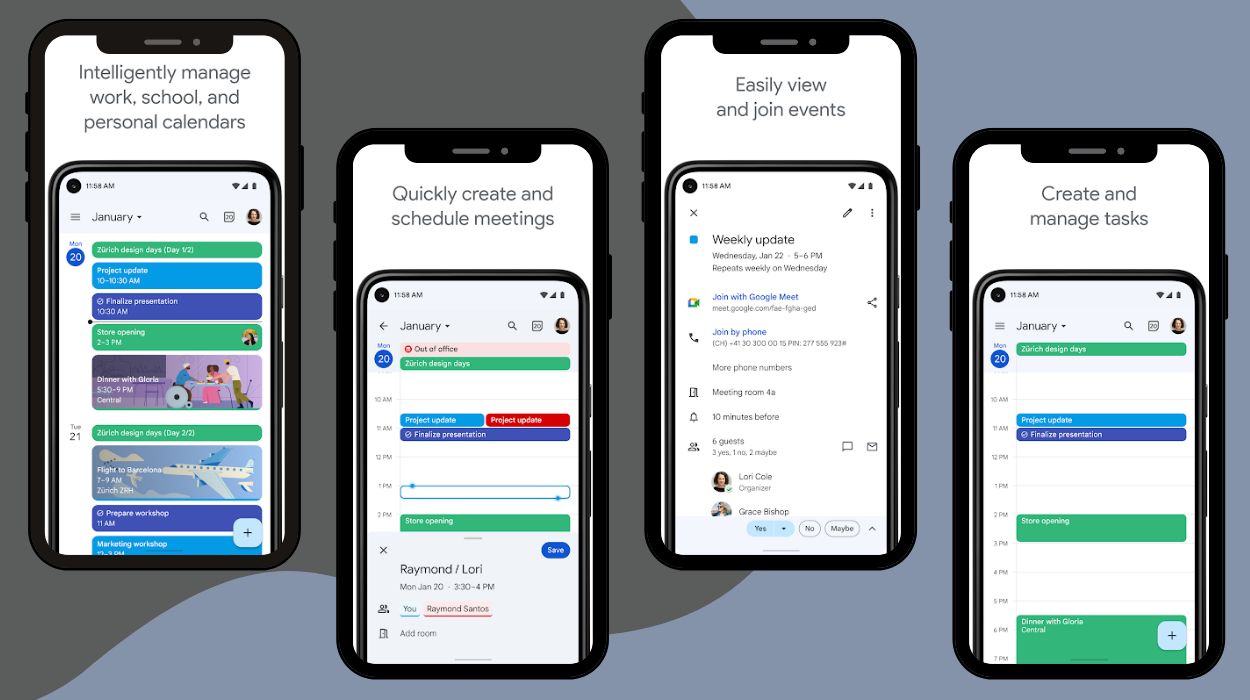
While not built specifically for co-parents, Google Calendar can be effectively used as a free co-parenting calendar app. You can simply create one calendar or color-code multiple calendars and share them with your ex. Any event, appointment, or reminder you add will sync automatically on both phones. It’s straightforward and reliable.
Features
- Shared schedule: All parties can add or edit events; instant syncing avoids conflicts.
- Notifications: Email or push reminders before events.
- Cross-platform: Works on any device and integrates with other Google services
Parents often rely on it because it’s free and familiar. For example, multiple redditors on r/coparenting said, “We use Google Calendar”, to keep both households synced.
Available on: iOS, Android and Web
Rating: 4.8★ on Google Play and 4.7★ on App Store
13. FamilyWall
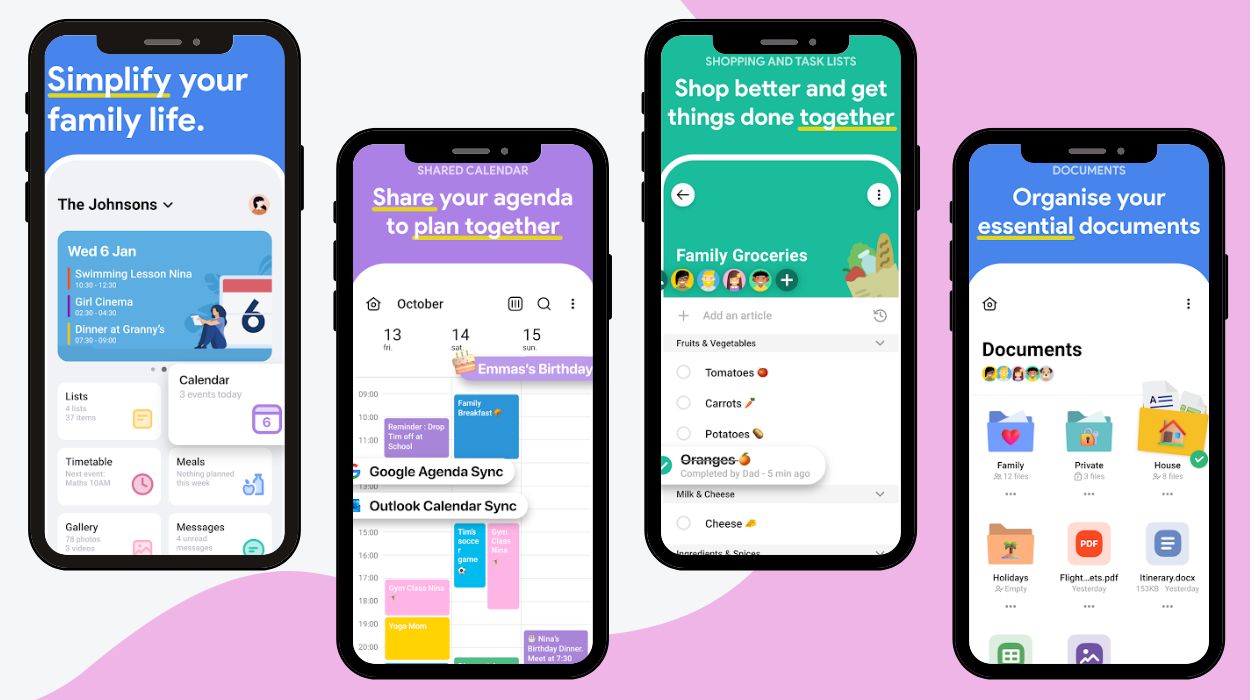
FamilyWall is a general family organizer with many co-parenting-friendly features. It offers a shared calendar, lists, tasks, and chat in one app. You set up one family group, where parents and kids can log in together. The calendar section lets you sync with Google Calendar, too. FamilyWall also supports shared grocery lists, to-dos, and even a budget tracker (premium). Real-time location is optional. It’s a communication app for divorced parents, through which you can message each other in family chats and share photos securely.
Features
- Family dashboard: Central place showing next events, chores, and lists
- Shared calendar: Coordinate everyone’s schedules and sync with Google Calendar
- Messaging: Instant family chat, including text, voice, and photos, with private groups for ex/extended family
- Lists and tasks: Collaborative shopping and to-do lists you all update in real time
FamilyWall’s site says it “helps manage your family’s everyday life” by sharing schedules, lists, and even tracking kids’ locations.
Pricing
| Plan | Price | Features |
| Basic | Free | Calendar, lists, chat, with ads |
| Premium | $3.99/month | Adds budget tools, meal planner, etc. |
Available on: iOS, Android and Web
Rating: 4.5★ on Google Play and 4.6★ on App Store
14. Fayr
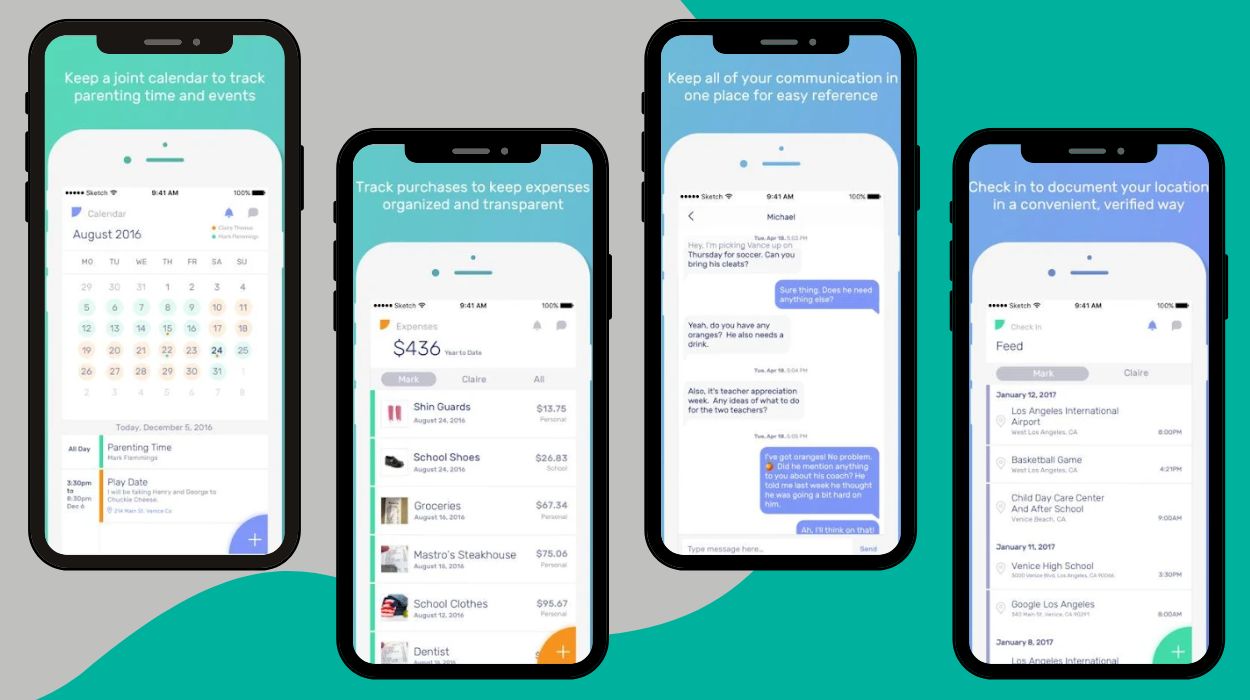
Fayr brands itself as a co-parenting collaboration app, built by a divorced parent. It offers a one-stop solution for tracking all co-parenting logistics. You can share calendars, messaging, expenses, and even location through Fayr. It also has unique support features: a conversational agent to “diffuse arguments” and a built-in emotion gauge. The focus is on making marriage separation “painless, transparent and fair.”
Features
- Expense logging: Record child-related costs and request reimbursements in-app
- Shared scheduling: Color-coded custody calendar for both parents
- Messaging and location: Secure chat and the ability to share check-ins or location updates
- Support tools: Built-in “emotional support” tips and co-parenting guides
- Privacy: Parent-to-parent communication is private and stored securely
Fayr’s tagline is “the app for a better co-parenting experience.” They claim it cuts down on legal costs and arguments by keeping everything logged. For example, they advertise that Fayr “helps you keep track of: expenses, scheduling, messaging and location” so there’s “less to disagree about.”
Pricing
| Plan | Price | Features |
| Free Trial | 30 days free trial | Full access |
| Subscription | $9.99/month | Full features |
Available on: iOS and Android
Rating: New app but gaining a lot of traction 4.6★ on App Store
| App | Key Features (Brief) | Platforms / Regions | Rating* |
|---|---|---|---|
| OurFamilyWizard | Secure messaging Shared custody calendar Expense tracking Kids’ info bank Recorded calls | iOS, Android, and Web | 4.5★ on App Store and 4.0★ on Google Play |
| TalkingParents | Immutable messaging Recorded calls Shared calendar Payments Standards & privacy | iOS, Android and Web | 4.4★ on App Store; 2.9★ on Google Play |
| AppClose | Free messaging & calendar Calls & video Expense tracker Medication & insurance logs Request features | iOS, Android and Web | 4.6★ on Google Play and 4.7★ on AppClose site |
| Cozi Family Organizer | Shared family calendar Lists and tasks Meal planner Agenda emails Cross-platform | iOS, Android and Web | 4.6★ on Google Play and 4.7★ on App Store |
| WeParent | Family calendar To-do & shopping lists Real-time chat Info vault Certified archiving | iOS and Android | Still too new to have substantial ratings |
| 2houses | Interactive calendar Expense manager Messaging Info bank Journal & albums | iOS, Android and Web | 3.9★ on App Store and 4.2★ on Google Play |
| Custody X Change | Custom custody schedules Log keeping Expense tracking Report generation Courts-approved | Windows; no mobile app | 4.7★ on Google Play and 4.8★ on App Store |
| FamCal | Family accounts Shared calendar Lists and tasks Notes | iOS, Android and Web | 4.9★ on App Store and 4.7★ on Google Play |
| SupportPay | Expense sharing Child support tracking Integrated chat and calendar Notifications Reports | iOS, Android and Web | 4.0★ on App Store and 3.7★ on Google Play |
| TimeTree | Multi-user calendar Event chat Notifications Integrations with Google Calender and import/export events | iOS, Android and Web | 4.8★ on App Store and 4.7★ on Google Play |
| Google Calendar | Shared schedule Notifications Cross-platform | iOS, Android and Web | 4.7★ on App Store and 4.8★ on Google Play |
| FamilyWall | Family dashboard Shared calendar Messaging Lists and tasks | iOS, Android and Web | 4.5★ on App Store and 4.6★ on Google Play |
| Fayr | Expense logging Shared scheduling Messaging and location Support tools Privacy | iOS and Android | 4.6★ on App Store |

How To Introduce An App to Your Co-Parent When Estranged
Suggesting a co-parenting app to someone you barely speak to can feel like walking on eggshells. The last thing you want is to sound controlling or as if you’re pushing your way of doing things. But there are ways to bring it up without adding more fuel to the fire.
- Keep it child-focused: Frame the idea around your child’s needs, not your convenience. For example: “I think using an app could help us stay on the same page with school updates, so our child doesn’t get caught in the middle.”
- Offer options, not ultimatums: Instead of naming one app and demanding they use it, share two or three choices and ask what they prefer. Giving them a say makes it less likely they’ll reject the idea outright.
- Show the benefits: Point out how it reduces confusion, missed handovers, or arguments about money. Sometimes seeing the practical upside is enough to get reluctant parents on board.
- Start with a trial run: Suggest using the app just for scheduling or expense logging at first. If it works smoothly, you can both expand its use over time.
- Keep the message short: A long explanation can feel like a lecture. A couple of sentences highlighting how it helps the child is usually enough.
- Be prepared for pushback: They may resist, at least initially. Stay calm, avoid taking it personally, and remind yourself that your aim is smoother parenting, not winning an argument.
Final Thoughts
Choosing the right co-parenting app can make life a lot smoother. Whether you need free co-parenting app basics like AppClose or FamilyWall, or a full-featured platform like OurFamilyWizard or Fayr for high-conflict cases, there’s a tool to fit your situation. We encourage you to try a couple: most have free tiers or trials, so you can test messaging, calendars, and expense features together. The key is to pick one that helps ensure that everyone involved is on the same page, minimizes fights, and even protects your legal rights. Pick what feels easiest for both of you, and let technology take some of the parenting burden off your shoulders.
Effects of Divorce | Psychological, Emotional & After Effects
15 Things Divorced People Should Know When In A New Relationship
Your contribution does not constitute a charitable donation. It will allow Bonobology to continue bringing you new and up-to-date information in our pursuit of helping anyone in the world to learn how to do anything.









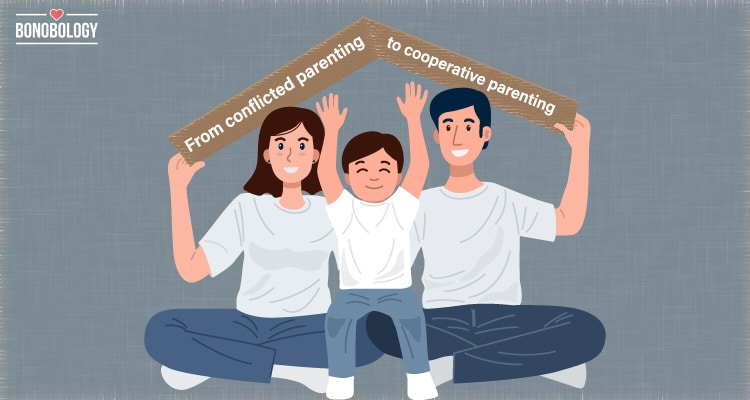

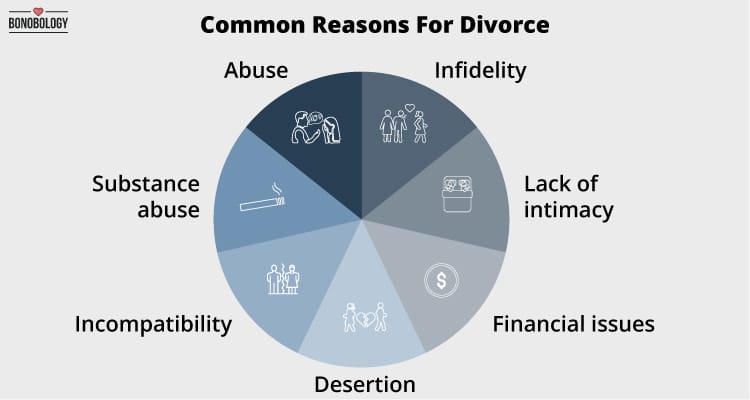










Featured
12 Best Dating Apps For Divorcees
The Hidden Benefits Of Divorce
Top Legal Tactics for Alimony Disputes Between Parents
Divorce Regret: What Is It, Signs, And Ways To Deal
The Pros And Cons Of Being Your Own Divorce Lawyer
15 Subtle Yet Strong Signs Your Marriage Will End In Divorce
10 Things To Do When You Are Thinking About Divorce
10 Tips For Divorced Parents To Handle Joint Custody Effectively
9 Sneaky Divorce Tactics And Ways To Combat Them
18 Most Common Reasons For Divorce
How To Cope With Divorce As A Man? EXPERT ANSWERS
11 Ways To Remain Sane During a Divorce
7 Important Things To Know About Dating While Separated
The Top Rules Of Separation In Marriage To Make It Successful
Lonely After Divorce: Why Men Find It So Hard To Cope
How To Rebuild Life After Divorce: Handling Kids, Money, Dating, And Self-Love
Failed Celebrity Marriages: Why Are Celebrity Divorces So Common And Expensive?
Surviving Divorce at 50: How To Rebuild Your Life
Gray Divorce 101 – A Guide To Divorce After A Long Marriage
Expert Advice – When To Call It Quits In A Marriage